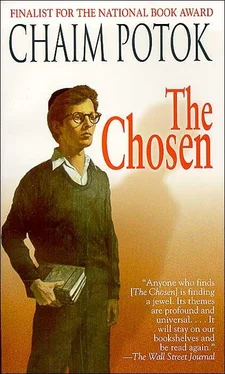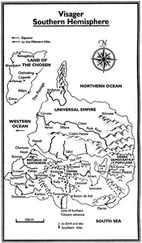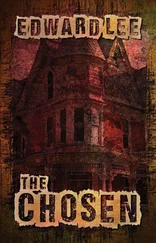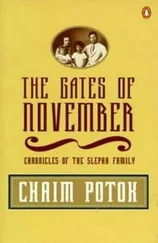I called Danny and told him I would be over on Sunday.
He sensed something in my voice. 'What's wrong?'
'Nothing's wrong. I'll see you on Sunday.'
'Nothing's wrong?' His voice was tight, apprehensive.
'No.'
'Come over around four,' he said. 'My father needs to rest in the early afternoons.'
'Four.'
'Nothing's wrong?'
'I'll see you on Sunday,' I told him.
On the afternoon of the first day of Passover, I walked beneath the early spring sycamores on my street, then turned into Lee Avenue. The sun was warm and bright, and I went along slowly, past the houses and the shops and the synagogue where my father and I prayed. I met one of my classmates and we stopped to talk for a few minutes; then I went on alone, turning finally into Danny's street. The sycamores formed a tangled bower through which the sun shone brightly, speckling the ground. There were tiny buds on these leaves. In a month, those leaves would shut out the sky, but now the sun came through and brushed streaks of gold across the sidewalks, the street, the talking women, and the playing children. I walked along slowly. remembering the first. time I had gone up this street years ago. Those years were coming to an end now. In three months, in a time when the leaves would be fat and full, our lives would separate like the branches overhead that made their own way into the sunlight.
I went slowly up the wide stone staircase of Danny's house and through the wooden double door of the entrance. The hall way was dim and cold. The synagogue door stood open. I peered inside. Its emptiness whispered echoes at me: mistakes, gematriya, Talmud quizes, and Reb Saunders staring at my left eye. You do not know yet what it is to be a friend. Scientific criticism, ah! Your father is an observer of the Commandments. It is not easy to be a true friend. Soft, silent echoes. It seemed tiny to me now, the synagogue, so much less neat than when I had seen it for the first time. The stands were scarred, the walls needed paint, the naked light bulbs seemed ugly, their bare, black wires like the dead branches of a stunted tree. What echoes will Reb Saunders'study have? I thought. And I felt myself go tight with apprehension.
I stood at the foot of the inner stairway and called Danny's name. My voice moved heavily through the silent house. I waited a moment, then called his name again. I heard the tapping of metal-capped shoes upon the third-floor stairway, then in the hallway over my head; and then Danny was standing at the head of the stairs, tall, gaunt, an almost spectral figure with his beard and earlocks and black satin caftan.
I climbed the stairs slowly, and he greeted me. He looked tired.
His mother was resting, he said, and his brother was out somewhere. He and his father were studying Talmud. His voice was dull, flat, only faintly edged with fear. But his eyes mirrored clearly what his voice concealed.
We went up to the third floor. Danny seemed to hesitate before the door to his father's study, almost as if he was wishing not to have to go back in there again. Then he opened the door, and we stepped inside.
It had been almost a year since I had last been inside Reb Saunders' study, but nothing about it had changed. There was the same massive, black wood, glass-topped desk, the same red carpet, the same glass-enclosed wooden bookcases jammed tight with books, the same musty old-book odor in the air, the same single light bulb glowing white behind its ceiling fixture. Nothing had really changed – nothing, except Reb Saunders himself.
He sat in his straight-backed, red leather chair and looked at me from behind the desk. His beard had gone almost completely gray, and he sat stooped forward, bent, as though he were carrying something on his shoulders. His brow was crisscrossed with wrinkles, his dark eyes brooded and burned with some kind of invisible suffering, and the fingers of his right hand played aimlessly with a long, gray earlock.
He greeted me quietly, but did not offer me his hand. I had the feeling that a handshake was a physical effort he wanted to avoid.
Danny and I sat in the chairs by his desk, Danny to his right, I to his left. Danny's face was expressionless, dosed. He tugged nervously at an earlock.
Reb Saunders moved forward slightly in the chair and put his hands on the desk. Slowly, he closed the Talmud from which he and Danny had been studying. Then he sighed, a deep, trembling sigh that filled the silence of the room like a wind.
'Nu, Reuven,' he said quietly, 'finally, finally you come to see me.' He spoke in Yiddish, his voice quavering a little as the words came out.
'I apologize,' I said hesitantly, in English.
He nodded his head, and his right hand went up and stroked his gray beard. 'You have become a man,' he said quietly. 'The first day you sat here, you were only a boy. Now you are a man.' Danny seemed suddenly to become conscious of the way he was twisting his earlock. He put his hand on his lap, clasped both hands tightly together and sat very still, staring at his father.
Reb Saunders looked at me and smiled feebly, nodding his head. 'My son, my Daniel, has also become a man. It is a great joy for a father to see his son suddenly a man.'
Danny stirred faintly in his chair, then was still.
'What will you do after your graduation?' Reb Saunders asked quietly.
'I have another year to study for smicha.'
'And then what?'
'I'm going into the rabbinate.'
He looked at me and blinked his eyes. I thought I saw him stiffen for a moment, as though in sudden pain. 'You are going to become a rabbi,' he murmured, speaking more to himself than to me. He was silent for a moment. 'Yes. I remember… " yes… ' He sighed again and shook his head slowly, the gray beard moving back and forth. 'My Daniel will receive his smicha in June,' he said quietly. Then he added, 'In June… Yes… His smicha… Yes…' The words trailed off, aimless, disconnected, and hung in the air for a long moment of tight silence.'
Then, slowly, he moved his right hand across the closed Talmud, and his fingers caressed the Hebrew title of the tractate that was stamped into the spine of the binding. Then he clasped both hands together and rested them on top of the Talmud. His body followed the movements of his hands, and his gray earlocks moved along the sides of his aged face.
'Nu,' he said, speaking softly, so softly I could barely hear him, in June my Daniel and his good friend begin to go different ways. They are men, not children, and men go different ways. You will go one way, Reuven. And my son, my Daniel, he will – he will go another way.'
I saw Danny's mouth fall open. His body gave a single convulsive shudder. Different ways, I thought. Different ways. Then he – 'I know,' Reb Saunders murmured, as if he were reading my mind. 'I have known it for a long time.'
Danny let out a soft, half-choked, trembling moan. Reb Saunders did not look at him. He had not once looked at him. He was talking to Danny through me.
'Reuven, I want you to listen carefully to what I tell you now.' He had said: Reuven. His eyes had said: Danny. 'You will not understand it. You may never understand it. And you may never stop hating me for what I have done. I know how you feel. I do not see it in your eyes? But I want you to listen.
'A man is born into this world with only a tiny spark of goodness in him. The spark is God, it is the soul; the rest is ugliness and evil, a shell. The spark must be guarded like a treasure, it must be nurtured, it must be fanned into flame. It must learn to seek out other sparks, it must dominate the shell. Anything can be a shell, Reuven. Anything. Indifference, laziness, brutality, and genius. Yes, even a great mind can be a shell and choke the spark.
Читать дальше












